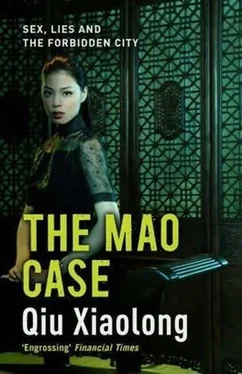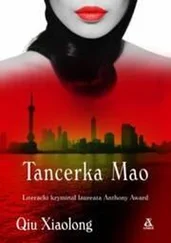“Let me think. There were some details, but I didn’t pay much attention to them,” Diao said, picking up a piece of pickled garlic. “Oh, she had a passion for photography, among other things.”
“You mean she liked taking pictures?”
“Yes. I tried to find some of those pictures for the book. According to her neighbors, she took a lot of pictures of Qian, but the special group from Beijing must have taken them all away. That’s another thing she and Madam Mao have in common. They both loved photography. A weird coincidence. Not many Chinese in the sixties could afford cameras. Shang even did her own developing, having converted a storage room into an occasional darkroom.”
“That’s unusual,” Chen said.
The waitress reappeared with a golden cart, on which she brought to their table an impressive array of special dishes.
“Shark fin stewed in the shape of Buddha’s fingers, camel paw braised with scallion, Mandarin-duck-like prawns, abalone in white sauce -”
“Why like Buddha’s fingers?” Diao asked again. “The Empress Dowager had long, long fingernails, like Buddha’s,” the waitress explained glibly. “In her day, people at the palace called her Old Buddha -”
“Thank you. We’ll enjoy them at our leisure,” Chen cut her short before she could start an elaborate introduction. “If we need anything else, we’ll let you know.”
“A different question, Mr. Diao,” Chen said as the cart wheeled out of the room. “In her last days, did Shang say anything concerning Mao to the Red Guards or to the special team from Beijing?”
“I talked to the Red Guards from her movie studio. According to them, she said something to the effect that Chairman Mao knew how much she loved him. No one took it seriously. At least not in the sense that she might have been suggesting. Every one could have said those words at the time. But I know nothing about what she might have said to the special team.”
“Now, why a special team from Beijing?”
“A common interpretation is that it was because of Madam Mao. Her persecution of her ex-fellow artists was brought up in the charges against her after the Cultural Revolution. For her, those who knew of her notorious past, especially those with old newspapers and letters in their possession, had to be silenced. Another guess was that it was because of Madam Mao’s jealousy. Once she became the head of the CPC Cultural Revolution Group, she ran amuck for her revenge. Several people who were supposedly ‘intimate and close’ to Mao were persecuted to death. Weishi, a young and beautiful Russian interpreter for Mao, was thrown into jail at the beginning of the Cultural Revolution and found dead in a stinking cell there, stark naked, her body bruised all over.”
“Madam Mao worshipped Empress Lu of the Han dynasty, lauding her to the skies during the Cultural Revolution. I’m no scholar, but I remember one story about Empress Lu,” Chen commented, chopsticking up a piece of shark fin shaped like a Buddha’s finger. “After the emperor died, Empress Lu threw his favorite concubine into jail. Cutting off her ex-rival’s arms and legs, severing her tongue, and gouging out her eyes. The empress kept the mutilated woman moaning and writhing in a sordid cell that was a stinking sty, her body naked and soiled. Empress Lu chose to show the woman to her own son like that, saying that it was a human pig.”
“Yes, her son never recovered from the shock, fell sick and died. That’s another story, of course.”
“So I have a question, Mr. Diao. Empress Lu did that after the death of the emperor. Madam Mao attacked her rivals when Mao was still alive. Wasn’t she afraid of him?”
“That was a question for me too. She described herself as a dog loyal to Mao, biting and attacking whomever he wanted her to. He might have needed her badly during the Cultural Revolution. Besides, Mao cared little for women no longer in his favor,” Diao said, taking a careful bite at the abalone. “This is the first abalone I’ve ever had.”
It was not the first for Chen, but it was the first time he was paying for it. He waited for Diao to continue.
“He dumped his wife Kaihui, without so much as divorcing her or notifying her, when he married Zizhen in the Jinggang Mountains,” Diao went on. “In fact, Kaihui’s death resulted from his siege of Changsha, a consequence he should have anticipated. After the Long March, he dumped Zizhen like another worn-out mop, letting her suffer alone in a Moscow mental institution, while he wallowed in the clouding and raining on the Kang bed with Madam Mao. So he dumped Shang, just one of the women he had slept with. It’s no surprise he didn’t do anything to help her.”
“That’s unbelievable,” Chen said, the slice of the stewed camel paw slipping from his chopsticks, splashing gravy out of the platter. He had no idea how the emperors could have enjoyed the fatty greasy taste.
“Think about what happened to Liu Shaoqi. Once the chairman of the People’s Republic of China, he, too, died naked in prison without any medical treatment, and his body was instantly cremated under a false name. Mao was so cold-blooded.”
“Leaving Mao aside, you mentioned in the book that the special team put a lot of pressure on Shang, to try and make her cooperate, but what could they have been trying to obtain from her?”
“From what I learned, it was something like ‘her evil plan to harm Mao.’ No one believed it.”
“Then what do you think it could be?”
“For one thing, an unpublished poem to her in his calligraphy.”
“That’s intriguing. A poem knocked off during a moment of amorous passion?” Chen said. But would that have triggered a special team from Beijing? After all, a poem could be open to many interpretations, unless it was downright erotic or obscene. He doubted it. “whatever it might be, did they find it?”
“I don’t know, but I don’t think so.”
“So could Shang have left it to her daughter Qian?”
“Not likely. Like other kids of black family background, Qian denounced Shang, and she didn’t come back home until after Shang’s death. No, Shang had no time to do so before jumping out of the window.”
“So Qian went through a dramatic change – from one radically cut off from her black family to one hopelessly lost in bourgeois carnival passion?”
“She was a girl traumatized at a young age, plagued by those stories about Shang’s ‘shameless sex saga,’ ” Diao said. “I don’t want to be too hard on her.”
“I couldn’t agree more. Qian, too, suffered a lot. But her death too was quite suspicious, I’ve heard.”
“Her death was an accident – almost at the end of the Cultural Revolution. I don’t see anything suspicious about it.”
“I see,” Chen said, picking up a pork-stuffed sesame cake, a surprisingly ordinary snack that tasted more agreeable than the exotic delicacies. “You must have talked to Jiao too.”
“She knew little about her mother, let alone her grandmother. An ill-fated girl.”
Diao must have contacted Jiao a couple of years earlier and was unaware of the subsequent change in her life.
“She’s doing fine now, I think,” Chen said. “Now, tell me more about what happened to Qian after Shang’s death.”
“Qian was driven out of her apartment -”
“Immediately?”
“No, two or three months after Shang’s death.”
“So, hypothetically, she could have looked around the apartment for something left behind by Shang.”
“Well, Shang could have left something behind, but the place had been turned upside down by the special group -”
Once again the waitress entered, serving the celebrated duck soup. The table now appeared overcrowded, several dishes untouched or hardly touched.
Читать дальше












